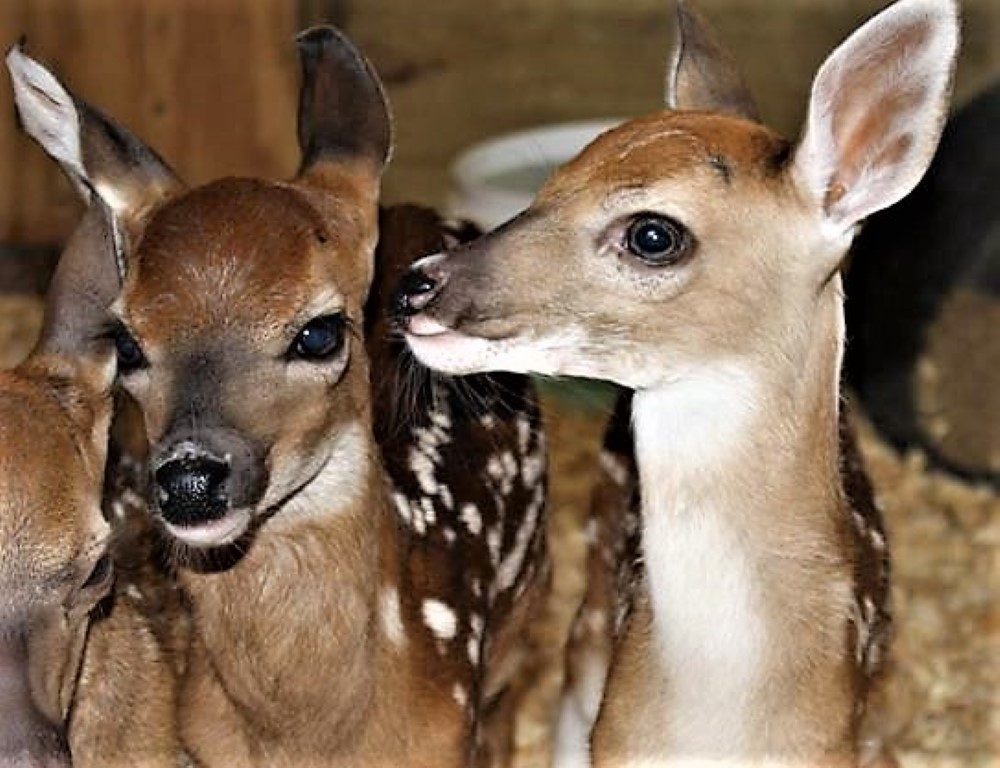Please consider all of the following IMPORTANT information and then make the choice to do what is best for the fawn and its future.
People often find healthy newborn fawns in the strangest places. Since they do not see the mother they are quick to believe the baby has been abandoned and is in need of help. This is NOT true!
Mother doe will park her baby in what she believes to be a safe place, in tall grass, near a tree or bush, or even on your back step. What may seem safe and hidden enough to mother doe at dawn or dusk may not be safe after humans, dogs, cars, etc., begin to move about. She will nurse her baby, stimulate it to eliminate and clean that up so there is no scent. Then mother will leave her baby alone. She knows her baby does not have any scent for the first few weeks of its life, but she does. If she stays with her baby she will attract predators. So she leaves it for hours at a time. While mother may return in the middle of the day, most often she will return at dawn and dusk. Usually she will then move the baby to a new location.
The baby’s strong natural instincts tell it to stay where it is until its mother returns. It may move about for a few feet as its legs get stronger, but mostly it will stay hidden near where its mother left it.
If something approaches it a healthy fawn may flatten itself to the ground and freeze in an effort to blend in.
If the fawn is just lying in place quietly and alone and it is not crying more than a few calls, there is a very good chance its mother has been back and fed it recently and she WILL return again. It is not true that animal mothers will abandon babies touched by humans. Animal mothers want their babies even if a human has touched the baby. More often than not mother doe WILL come back for her baby. But she may be too frightened to come back until the area is clear of all humans, dogs, and activity.
Please DO NOT move the baby. Leave the baby where it is. All people should move far away from the baby and all dogs should be moved inside and contained to give mother a chance to return. If you have removed the baby, put it back where you found it facing it away from you and quickly run away before it follows. If it tries to follow repeat. Even if it moves it will want to stay near the cover of woods and settle down. If it is hungry its call will bring mother doe. Remember it may take hours. She may wait until dusk or dawn or she may return in the middle of the day, BUT SHE WILL RETURN ONCE THE AREA IS QUIET AND CLEAR OF ALL ACTIVITY. A couple hours after the next dawn or dusk you may return just close enough to check that the baby is gone. Happily, usually the baby will be gone. No one can care for and teach survival skills better than a wild animal’s own mother. This is what we want and what is the very best for the fawn.
However, if a found fawn is bleeding or obviously injured, covered in flies or maggots, running around frantically, crying nonstop, running after you, lying stretched out on its side head back or next to its dead mother or it has been left well past the next dawn or dusk, or is in danger from cars or roads or stuck in a fence please do call the Keeper of the Wild fawn rehabilitator at (843) 557-9008 or (843) 761-3400 immediately. If necessary, please leave a message and your call will be returned as soon as possible.
In the meantime, do not feed the fawn cow’s milk, infant formula, puppy formula, goat’s milk or any other milk or formula. These can cause severe diarrhea and kill a fawn. A small amount of Pedialyte, Gatorade, or Smart Water at room temperature in a baby bottle will help hydrate a fawn temporarily until an experienced rehabilitator can provide the correct formula. It is a good idea to put the injured fawn in a covered dog crate or alone in a small room or bathroom away from dogs, kids, family, TV and music noises. It should be kept in a warm area that is as quiet and dark as possible to minimize stress while you await contact with the Keeper of the Wild Fawn Rehabilitator.
Also, please do not choose to care for the fawn yourself. Wild animals require different care than domestic pets. Fawns have delicate digestive systems. Even a caring person can feed the wrong food and cause more harm than good in a wild animal. At Keeper of the Wild our foster moms know the physiology of each specie. We know how to “think wild”, and maintain a wild animal’s natural survival skills so it may retain its natural fears so necessary for survival in the wild.


